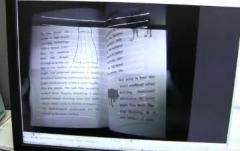March 18, 2010 report
Scanner scans a 200 page book in one minute (w/ Video)

(PhysOrg.com) -- Japanese researchers are developing a super-fast scanner that will be able to scan a book of about 200 pages in a minute without any need to break up or flatten the book.
A research team led by Professor Masatoshi Ishikawa of the University of Tokyo has developed a prototype scanner that allows users to scan a book simply by rapidly flipping its pages. A high-speed camera operating at 500 fps and producing pictures with a resolution of 1280 x 1024 pixels, takes pictures of the page and its contents of text and images under ordinary light. A laser then projects lines on the page, and the camera captures this image as well. The lines allow the system to adjust for the curvature and distortion of pages as they are being flipped, and the software reconstructs the image into a digitized picture of a flat, regular page.
The prototype is large, occupying an entire laboratory bench, but the team aims to simplify and miniaturize the device so it can be incorporated into portable gadgets such as smartphones. There are challenges, apart from miniaturization, since pages can be skipped while you are flipping a book, and the images may not be of high resolution. Copyright issues will also need to be addressed. When one of the researchers, Yoshihiro Watanabe, approached a publisher for permission to use their books for testing the scanner, he was forbidden to use them, and had to create a mock book for testing.
Google also has a patent for a book-scanning system, which uses two cameras and an infrared light source to correct for the curvature of the book pages. The results are presented online as flat-looking pages.
Prof. Ishikawa is a well-known robotics scientist who has demonstrated some amazing robots, such as a robotic hand capable of catching objects in mid-air or dribbling a ball. The robots are equipped with what Prof. Ishikawa calls a Super Vision Chip that sees events too fast for the human eye.
Other applications Ishikawa and his team are working on include a microscope capable of tracking individual bacteria, and a motion-capture system for video games using gesture playing.
© 2010 PhysOrg.com



















